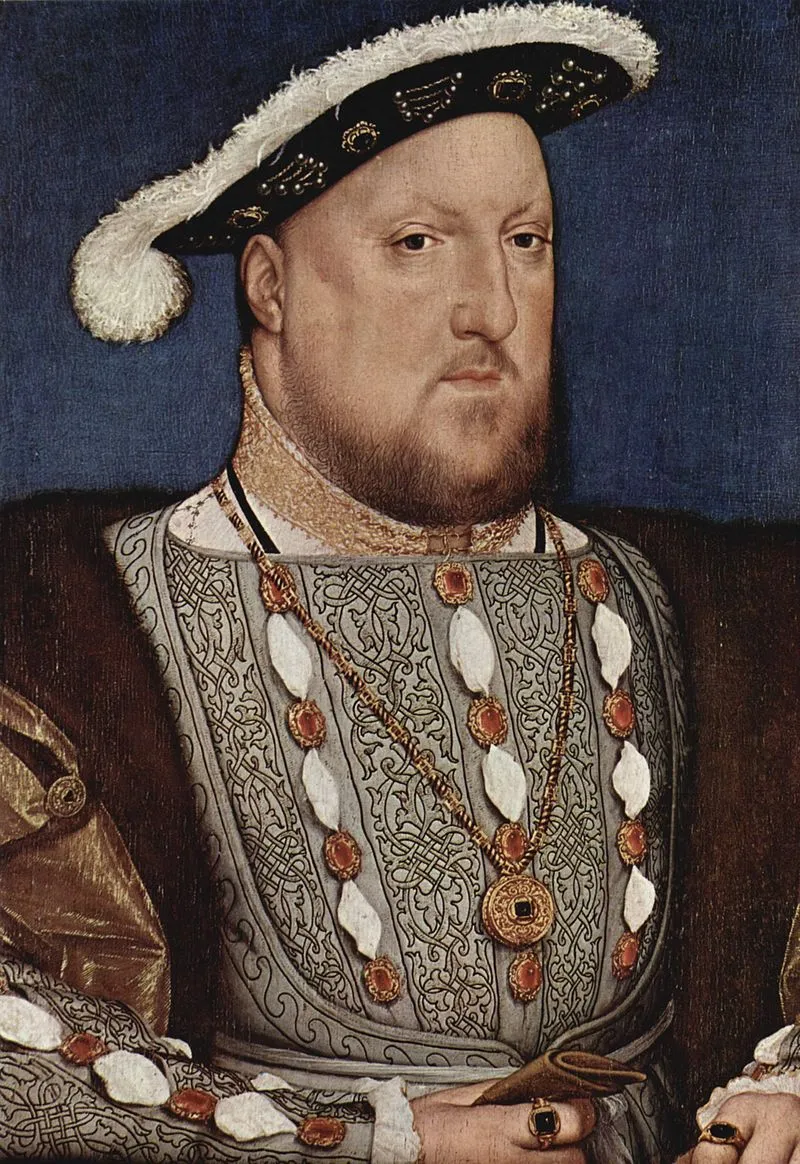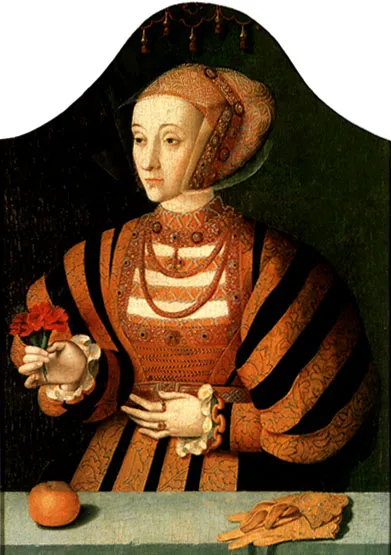Did Anne of Cleves Ever Marry Again
:focal(392x236:393x237)/https://tf-cmsv2-smithsonianmag-media.s3.amazonaws.com/filer/02/cf/02cfc7cc-0bc3-4a7f-9265-aaf55115c5e9/800px-anne_of_cleves_by_hans_holbein_the_younger.jpg)
A new novel by Tudor historian Alison Weir outlines a controversial culling to the oftentimes-cited business relationship of Henry Eight'south divorce from his 4th wife, Anne of Cleves. As Sarah Knapton reports for the Telegraph, Weir's Anna of Kleve: The Princess in the Portrait, the fourth installment in the non-fiction and fiction writer'due south Six Tudor Queens series, theorizes that the notoriously mercurial king ended his marriage later on discovering his new married woman had already conceived a child with another homo.
The traditional story widely accepted past historians is far less scandalous: Henry, enchanted by a flattering Hans Holbein portrait of his helpmate-to-exist, was repulsed by the "tall, big-boned and strong-featured" woman who arrived in England at the beginning of 1540. Declaring "I similar her not! I like her not!" later on his first meeting with her, the English male monarch only went through with the wedding ceremony to maintain diplomatic ties with Anne'southward home, the German Duchy of Cleves, and other Protestant allies across the European continent.
After simply half-dozen months of wedlock, Henry, eager to replace his short-reigning queen with the young, vivacious Catherine Howard, had the union annulled on the grounds of not-consummation and Anne's pre-contract with Francis, Knuckles of Lorraine. Anne, from so on known as the "King'due south honey sister," spent the rest of her days in England, outliving not just her erstwhile husband, merely both of the wives that followed her and her one-time stepson, Edward Half dozen.
In a 2018 interview with The New York Times, Weir explained that her theory stems from a "hitherto unnoticed thread of evidence that merited farther investigation." Citing the Letters and Papers, Foreign and Domestic, of the Reign of Henry VIII, every bit well as biographies by Elizabeth Norton, Mary Saaler and Retha Yard. Warnicke, the writer acknowledges the unsubstantiated nature of her claim but points out, per a separate weblog postal service for the Tudor Times, that while "the evidence is not conclusive, … you may find information technology disarming or that it makes you call up again, every bit I did."
Weir's theorize has already proven contentious, with fellow historian Dan Jones deeming the idea "incredibly silly and actually sort of weirdly misogynist"—a sentiment echoed by the Anne Boleyn Files, a popular Tudor history blog, in a Facebook post that calls the theory "poppycock" and "clearly a fictional device." But every bit the author herself acknowledged during a contempo session at the literary Hay Festival, the proposed explanation is meant to be "inconclusive and speculative."

Weir's novel takes a closer look at claims Henry made on the morning after his wedding ceremony. As recounted by historian Tracy Borman in an article published by History Extra, the 48-yr-old rex told Thomas Cromwell, the advisor who arranged the marriage, that he had been besides perturbed to do more than run his hands over Anne'due south body. "She is nothing fair, and accept very evil smells about her," Henry reportedly said, adding that he "plainly mistrusted her to be no maid by reason of the looseness of her abdomen and breasts and other tokens."
The king concluded, "I have left her as practiced a maid every bit I found her."
Borman writes that the 2 most plausible explanations for the marriage's lack of consummation are the well-documented distaste Henry felt for his bride—in Anne's defense, it'southward worth noting that no one had spoken negatively of her appearance prior to the king, who was himself far from the handsome, able-bodied prince of his youth—and the Tudor monarch'south ain impotence, as brought on by old age, immobility linked with an ulcerated jousting wound, and his increasingly widening girth.
Merely in her novel's author's annotation, Weir questions whether Henry could have actually been telling the truth, or at to the lowest degree a version of events he believed to be true. Equally the historian argues, he had "vast feel" with women and "must have known the difference between a female torso that had borne children and one that had non." It'due south possible, therefore, that Henry recognized signs of a previous pregnancy (perhaps resulting from an affair with a cousin during Anne's youth) and failed to consummate the marriage for this reason. Weir farther speculates that the male monarch ultimately chose to hide his discovery—still his post-wedding ceremony proclamations—in order to avoid scandal and preserve his alliance with Cleves.
A central slice of evidence cited by Weir dates to a 17th-century biography of Henry by ane Lord Herbert. Said to take access to long-lost sources, Herbert wrote that at that place were "secret causes, which the Male monarch, without corking necessity would not accept disclosed, because they touch'd the Honour of the Lady," surrounding the dissolution of Henry's 4th marriage.
"Could those secret causes be connected with Henry'due south oftentimes-voiced doubts almost Anna's virginity?" Weir asked during her Hay Festival spoken language. "There tin exist little doubt that if she contested the case he would have used them against her, and that's ... one practiced reason she did not."

Writing for the Tudor Times, Weir contextualizes her controversial theory past addressing rumors surrounding Anne's comport following the divorce. In October 1540, the French ambassador debunked gossip suggesting Henry wanted to exit his fifth queen, Catherine Howard, in favor of "the one whom he has repudiated." The ambassador added, "That which caused the study was that it has been said the other lady, who has been indisposed, was pregnant." (Most historians aspect this period of illness to a gastric outcome, not pregnancy.)
In December 1541, some other report of seeming venial surfaced; this time, the rumor suggested that Anne "was in the family unit way by the King" and had maybe even given birth to Henry'southward son. Subsequently an all-encompassing investigation, however, the Privy Council concluded that "the King had non behaved to her like a husband," and it was not true that Anne had "gone away from London and had a son in the land last summertime." Withal, Weir writes, "Although nearly all modern historians country categorically that [Anne] had not borne a kid, the possibility remains that she had, [though] it was surely non the King's."
Anne's own business relationship of her matrimony refutes the idea that she had any cognition of lecherous affairs. At one indicate during her brief queenship, Anne asked her ladies-in-waiting how she could "be a maid and sleep every night with the rex." In response, one woman fabricated a joking remark about how more than than but sleep was required to produce a prince—to which the queen said, "When he comes to bed, he kisses me and taketh me by the manus and biddeth me, 'Goodnight sweetheart'; and in the morning kisses me and biddeth me, 'Goodbye, darling.' Is that not plenty?" The Countess of Rutland had to explain, "Madam, there must be more this, or information technology volition be long ere we have a Duke of York" (the second son required to fulfill the platonic of an "heir and a spare").
Compared to the rest of Henry VIII's wives, Anne of Cleves came out relatively lucky. She escaped the marriage with her head intact and enjoyed the king'due south favor, probable earned by agreeing to the disparateness, until his death in 1547. She survived Henry by 10 years, dying on July 16, 1557, at the age of 41.
Source: https://www.smithsonianmag.com/smart-news/historians-new-novel-controversially-theorizes-henry-viii-divorced-anne-cleves-because-shed-already-given-birth-180972415/
Post a Comment for "Did Anne of Cleves Ever Marry Again"